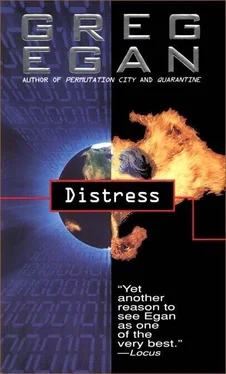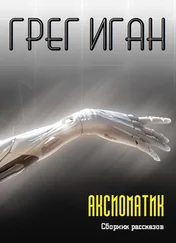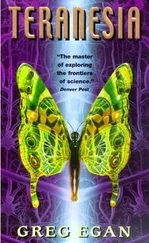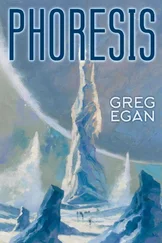Грег Иган - Distress
Здесь есть возможность читать онлайн «Грег Иган - Distress» весь текст электронной книги совершенно бесплатно (целиком полную версию без сокращений). В некоторых случаях можно слушать аудио, скачать через торрент в формате fb2 и присутствует краткое содержание. Жанр: Фантастика и фэнтези, на английском языке. Описание произведения, (предисловие) а так же отзывы посетителей доступны на портале библиотеки ЛибКат.
- Название:Distress
- Автор:
- Жанр:
- Год:неизвестен
- ISBN:нет данных
- Рейтинг книги:3 / 5. Голосов: 1
-
Избранное:Добавить в избранное
- Отзывы:
-
Ваша оценка:
- 60
- 1
- 2
- 3
- 4
- 5
Distress: краткое содержание, описание и аннотация
Предлагаем к чтению аннотацию, описание, краткое содержание или предисловие (зависит от того, что написал сам автор книги «Distress»). Если вы не нашли необходимую информацию о книге — напишите в комментариях, мы постараемся отыскать её.
Distress — читать онлайн бесплатно полную книгу (весь текст) целиком
Ниже представлен текст книги, разбитый по страницам. Система сохранения места последней прочитанной страницы, позволяет с удобством читать онлайн бесплатно книгу «Distress», без необходимости каждый раз заново искать на чём Вы остановились. Поставьте закладку, и сможете в любой момент перейти на страницу, на которой закончили чтение.
Интервал:
Закладка:
"Go ahead, dazzle me with science."
She hit the CONFIRM ORDER button. "The green leafy stuff will taste like spinach-flavored pasta—but the iron in it will be absorbed by your body as easily as the haem iron in animal flesh, leaving spinach for dead. The yellow things which look like corn will taste like a cross between tomato and green capsicum spiced with oregano—but nutrients and flavor will be less sensitive to poor storage conditions and overcooking. And the blue puree will taste almost like parmesan cheese."
"Why blue?"
"There’s a blue pigment, a photoactivated enzyme, in the new self-fermenting lactoberries. They could remove it during processing, but it turns out we metabolize it directly into vitamin D—which is safer than making it the usual way, with UV on the skin."
"Food for people who never see the sun. How can I resist?" I ordered the same.
The service was swift—and Gina’s predictions were more or less correct. The whole combination was actually quite pleasant.
I said, "You’re wasted on wind turbines. You could be designing the spring collection for United Agronomics."
"Gee, thanks. But I already get all the intellectual stimulation I can handle."
"How is Big Harold coming along, anyway?"
"Still very much Little Harold, and likely to stay that way for a while." Little Harold was the one-thousandth-scale prototype of a projected two-hundred-megawatt turbine. "There are chaotic resonance modes turning up which we missed in the simulations. It’s starting to look like we’re going to have to re-evaluate half the assumptions of the software model."
"I can never quite understand that. You know all the basic physics, the basic equations of air-flow dynamics, you have access to endless supercomputer time…"
"So how can we possibly screw up? Because we can’t compute the behavior of thousands of tons of air moving through a complex structure on a molecule-by-molecule basis. All the bulk flow equations are approximations, and we’re deliberately operating in a region where the best-understood approximations break down. There’s no magical new physics coming into play—but we’re in a gray zone between one set of convenient simplifying assumptions and another. And so far, the best new set of compromise assumptions are neither convenient nor simple. And they’re not even correct, as it turns out."
"I’m sorry."
She shrugged. "It’s frustrating—but enough of it’s frustrating in an interesting way to keep me from going insane."
I felt a stab of longing; I understood so little about this part of her life. She’d explained as much as I could follow, but I still had no real idea of what spun through her head when she was sitting at her work station juggling airflow simulations, or clambering around the wind tunnel making adjustments to Little Harold.
I said, "I wish you’d let me film some of this."
Gina regarded me balefully. "Not a chance, Mister Frankenscience. Not until you can tell me categorically whether wind turbines are Good or Evil."
I cringed. "You know that’s not up to me. And it changes every year. New studies are published, the alternatives come in and out of favor—"
She cut me off bitterly. "Alternatives? Planting photovoltaic engineered forests on ten thousand times as much land per megawatt sounds like environmental vandalism to me."
"I’m not arguing. I could always make a Good Turbine documentary… and if I can’t sell it straight away, just wait for the tide to turn again."
"You can’t afford to make anything on spec."
"True. I’d have to fit it in between other shooting."
Gina laughed. "I wouldn’t try it. You can’t even manage—"
"What?"
"Nothing. Forget it." She waved a hand, retracting the comment. I could have pressed her, but I would have been wasting my time.
I said, "Speaking of filming…" I described the two projects Lydia had offered me. Gina listened patiently, but when I asked for her opinion, she seemed baffled.
"If you don’t want to make Distress… then don’t. It’s really none of my business."
That stung. I said, "It affects you, too. It would be a lot more money." Gina was affronted. "All I mean is, we could afford to take a holiday, or something. We could go overseas next time you have leave. If that’s what you wanted."
She said stiffly, "I’m not taking leave for another eighteen months. And I can pay for my own holidays."
"All right. Forget it." I reached over to take her hand; she pulled away, irritated.
We ate in silence. I stared down at my plate, running through the rules, trying to decide where I’d gone wrong. Had I broken some taboo about money? We kept separate accounts, sharing the rent fifty-fifty— but we’d both helped each other out, many times, and given each other small luxuries. What should I have done? Gone ahead and made Distress—purely for the money—and only then asked if there was anything we could spend it on together that would make it worthwhile?
Maybe I’d made it sound as if I thought she expected to dictate the projects I chose—offending her by seeming to have failed to appreciate the independence she allowed me. My head spun. The truth was, I had no idea what she was thinking. It was all too hard, too slippery. And I couldn’t imagine what I could say that might begin to put it right, without the risk of making everything far worse.
After a while, Gina said, "So where’s the big conference being held?"
I opened my mouth, then realized I didn’t have a clue. I picked up my notepad and quickly checked the briefing Sisyphushad prepared.
"Ah. On Stateless."
"Stateless?" She laughed. "You’re a burnt-out case on biotech… so they’re sending you to the world’s largest engineered-coral island?"
"I’m only fleeing Evil biotech. Stateless is Good."
"Oh, really? Tell that to the governments who keep it embargoed. Are you sure you won’t get thrown in prison when you come home?"
"I’m not going to trade with the wicked anarchists. I’m not even going to film them."
"Anarcho-syndicalists, get it right. Though they don’t even call themselves that, do they?"
I said, "Who’s they ? It depends who you ask."
"You should have had a segment on Stateless in Junk DNA. Embargoed or not, they’re prospering—and all thanks to biotechnology. That would have balanced the talking corpse."
"But then I couldn’t have called it Junk DNA, could I?"
"Exactly." She smiled. Whatever I’d done, I’d been forgiven. I felt my heart pounding, as if I’d been dragged back at the last moment from the edge of an abyss.
The dessert we chose tasted like cardboard and snow, but we obligingly filled out the tabletop questionnaires before leaving.
We headed north up George Street to Martin Place. There was a nightclub called the Sorting Room in the old Post Office building. They played Zimbabwean njari music, multi-layered, hypnotic, pounding but never metronomic, leaving splinters of rhythm in the brain like the marks of fingernails raked over flesh. Gina danced ecstatically, and the music was so loud that speech was, mercifully, almost impossible. In this wordless place I could do no wrong.
We left just after one. On the train back to Eastwood, we sat in a corner of the carriage, kissing like teenagers. I wondered how my parents' generation had ever driven their precious cars in such a state. (Badly, no doubt.) The trip home was ten minutes—almost too short. I wanted everything to unfold as slowly as possible. I wanted it to last for hours.
We stopped a dozen times, walking down from the station. We stood outside the front door for so long that the security system asked us if we’d lost our keys.
Читать дальшеИнтервал:
Закладка:
Похожие книги на «Distress»
Представляем Вашему вниманию похожие книги на «Distress» списком для выбора. Мы отобрали схожую по названию и смыслу литературу в надежде предоставить читателям больше вариантов отыскать новые, интересные, ещё непрочитанные произведения.
Обсуждение, отзывы о книге «Distress» и просто собственные мнения читателей. Оставьте ваши комментарии, напишите, что Вы думаете о произведении, его смысле или главных героях. Укажите что конкретно понравилось, а что нет, и почему Вы так считаете.










![Грег Иган - Рассказы [компиляция]](/books/419837/greg-igan-rasskazy-kompilyaciya-thumb.webp)
